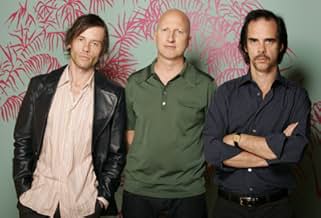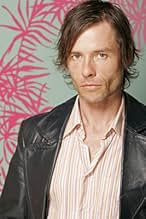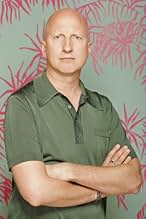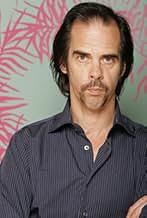A lawman apprehends a notorious outlaw and gives him nine days to kill his older brother, or else they'll execute his younger brother.A lawman apprehends a notorious outlaw and gives him nine days to kill his older brother, or else they'll execute his younger brother.A lawman apprehends a notorious outlaw and gives him nine days to kill his older brother, or else they'll execute his younger brother.
- Awards
- 14 wins & 30 nominations total
- Director
- Writer
- All cast & crew
- Production, box office & more at IMDbPro
Featured reviews
Directed by Brisbanite John Hillcoate from a script by Aussie indie icon Nick Cave, this film has some of the most gorgeous photography of the Australian outback ever committed to film, showcasing it's unique desolate beauty in it's dust, flies and exquisite sunsets.
Hillcoate assembles a very fine ensemble cast, most notably Ray Winstone as Captain Stanley and Guy Pearce as Charlie Burns - two actors performing at the top of their game. Danny Huston is effective as Arthur Burns, a man whose serene exterior belies his vicious temperament. Other performers include Emily Watson and John Hurt, as well as fine Australian talent David Wenham, Leah Purcell, Tommy Lewis and quintessential movie aborigine David Gulpilil. All performances are excellent.
Despite it's high violence quotient, the film has an admirable lack of moralistic tone. There are no obvious good guys and bad guys, all the characters are shades of grey possessing both positive and negative attributes, although some characters may lean one way or the other. In particular, Captain Stanley has a good heart though history may judge his methods of justice with contempt, and Charlie Burns has a fierce sense of loyalty and honour but his associated family ties have led him to commit horrific crimes. Even Captain Stanley's wife, Martha, in all her Victorian innocence and naivety, has a dark side to her soul; an attribute which will further propel all towards their destinies.
It's strong subtext of white colonialists' condescending treatment of the aboriginal population puts this film in fine company with other Australian indigenous-themed films such as Fred Schepisi's The Chant Of Jimmy Blacksmith, Nicholas Roeg's Walkabout, Rolf de Heer's The Tracker and Phillip Noyce's Rabbit Proof Fence. The Proposition is the best of these. This is a big call, I know, but the fact is that none of those other very fine Australian films possess the tension which so completely permeates Hillcoates' picture. This film represents a major achievement for both Hillcoate and Cave and is the best Australian film to leave these shores since Ray Lawrence's Lantana.
8.5 out of 10.
Slick. :cool:
"The Proposition" (2005) is a Western that takes place in Australia, yet it's far from a typical Western. The filmmaking, cinematography, actors, locations, soundtrack and editing are top-of-the-line with a surreal, haunting edge. As my title blurb suggests, there are similarities to "Heart of Darkness" and the original "Apocalypse Now," although it fails to achieve the greatness of the latter.
The story plays out in a realistic manner with long stretches of drama and bleak landscapes interspersed with flashes of extreme violence. Ray Winstone and Guy Pearce are great as the two main protagonists. Capt. Stanley understandably wants to rid the land of the brute outlaws, whereas Charlie seeks redemption for himself and his little brother.
Danny Huston is captivating as the focal point and villain, Arthur Burns. Yet he's not a villain in the cliched sense and he's not one-dimensional. He loves the beauty of God's creation, he loves the art of language and he's a mystic of sorts, but he clearly crossed the line at some point in his outlaw endeavors and now must be wiped off the face of the planet. Will Charlie do it?
My only criticism is that the film seems too short at 1 hour, 44 minutes. It needed more time for details and character development. As it is, we sort of have to guess the details, which isn't necessarily a bad thing. I just wish the film would have gone the route of "Apocalypse Now" and given us more definition and development.
At the end of the day, this is one of those films that gets better with repeat viewings, as long as you like the approach of films like "Apocalypse Now," just way shorter (too short). I would love to see a Director's Cut that adds about 20-45 minutes.
It was shot in Winton, Queensland, which is in the northeast Outback of Australia.
GRADE: B+
There's a fantastic blend of European and Australian sensibilities here that makes this the least clichéd film to come out of this country for 20-odd years - and if it doesn't do well, it'll be because an increasingly soft and gutless nation is afraid to venture out of their frappuccino and mortgage comfort zone.
This is powerful, worthy art.
Nick Cave's script is shot through with his signature dark poetry; it translates wonderfully onto the screen. Guy Pearce, Ray Winston and Danny Huston put in powerful performances. Emily Watson is also superb but somehow this film seems to be more about men than women and so her performance feels a little isolated from the rest of the movie.
The film is a strangely skewed morality tale crossed with a tale of the absurd. There is something so absurd about Captain Stanley's English breakfast and standard roses in the hot, fly-blown wastelands of the movie, and off course there is something so absurd about how violent humans beings are to each other. Despite all the violence though, some of which is stomach-turning, this movie has some moments of great tenderness and elegy.
Did you know
- TriviaIn a 2018 interview, Guy Pearce said that this is his favorite of all of the movies he's ever done.
- GoofsAlthough the story takes place in the 1880s, Jellon sings "Danny Boy" - which wasn't published until 1913.
- Quotes
Jellon Lamb: Forgive me, sir, but I've been stuck here with no one but this sorry sack of Hibernian pig shit for conversation. Poor, poor Dan O'Reilly. Sit, sir. Drink with me.
[Charlie cocks his gun and points it to Lamb]
Charlie Burns: One more crack about the Irish, Mr. Lamb, and I'll shoot you. Am I clear?
Jellon Lamb: Oh, as the waters of Ennis, sir. Let us drink, then, to the Irish. No finer race of men have ever... peeled a potato.
[Charlie cocks his gun again and points it to Lamb]
Charlie Burns: Do you pray, Mr. Lamb?
- Crazy creditsThe opening credits are shown first against a background of period photographs of Australia, which after a time become photographs of the actors/characters, locations and scenes in the film. The end credits are similarly displayed, but only period photographs are used. This is of special note in view of the noted disclaimer, since some indigenous aboriginal groups can be offended by such images.
- SoundtracksThere Is a Happy Land
(1850)
Traditional
Music by Leonard P. Breedlove (uncredited) (1850)
Words by Andrew Young (1838)
Arranged by Nick Cave and Warren Ellis
- How long is The Proposition?Powered by Alexa
Details
Box office
- Budget
- $20,000,000 (estimated)
- Gross US & Canada
- $1,903,434
- Opening weekend US & Canada
- $32,681
- May 7, 2006
- Gross worldwide
- $5,048,893
- Runtime
- 1h 44m(104 min)
- Color
- Sound mix
- Aspect ratio
- 2.39 : 1













































